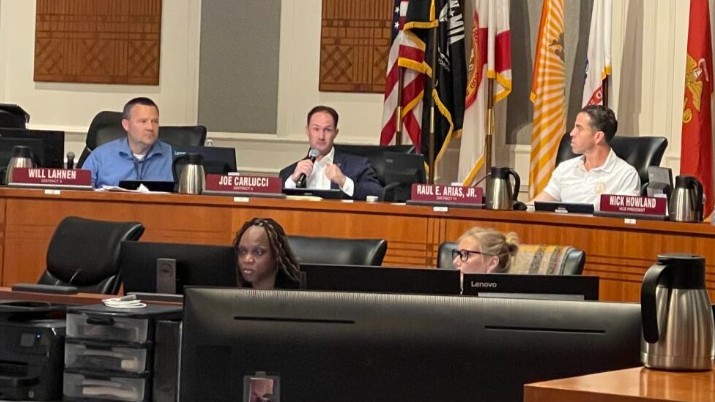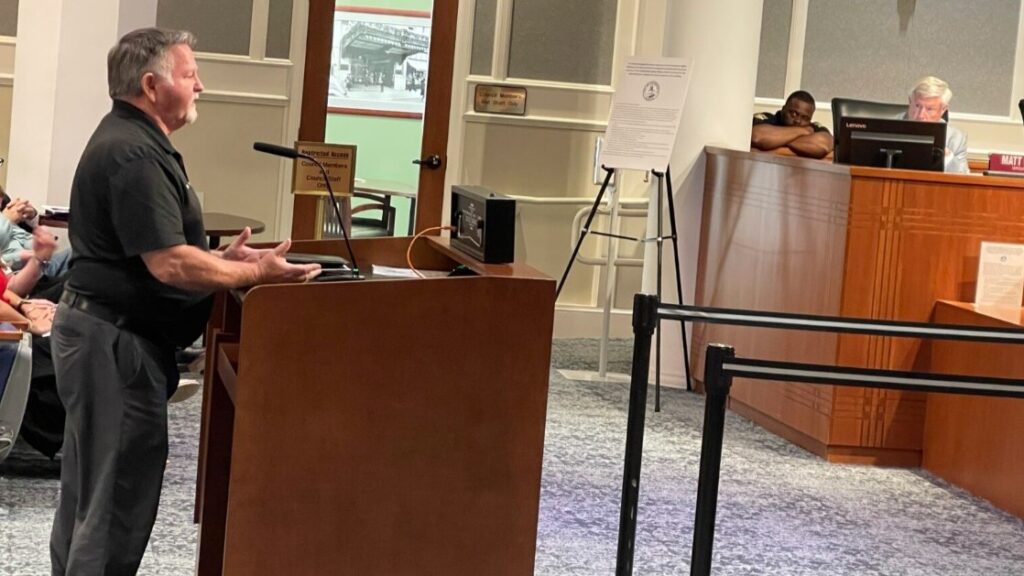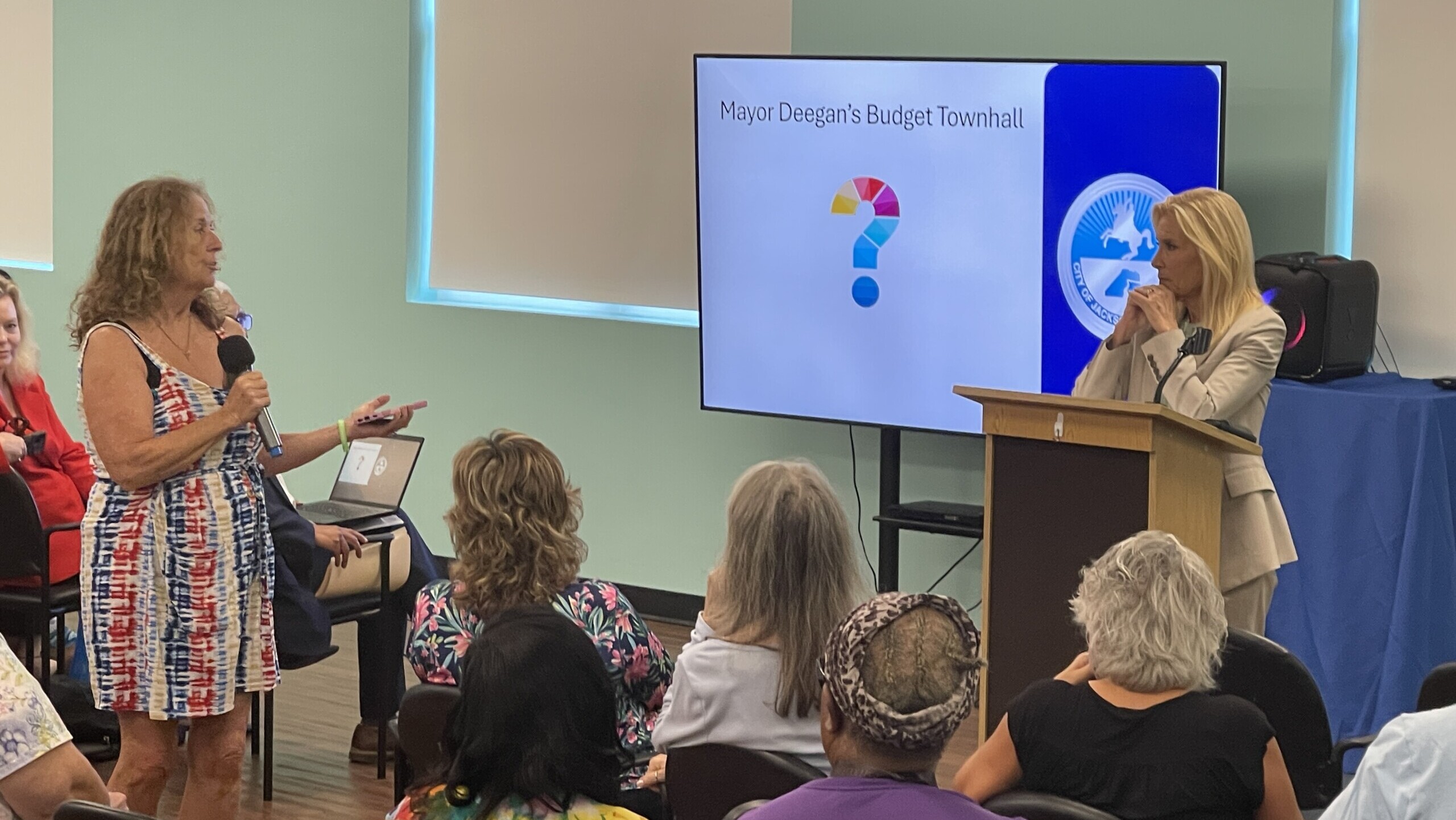When the full Jacksonville City Council gets its first chance Sept. 9 to vote on next year’s property tax millage rate, there will be more pressure for lawmakers to vote for a cut.
The council’s Finance Committee advanced its final recommendation to chip ⅛-mill off the city’s millage rate, which would lock in a nearly $14 million drop in projected revenue next year and cuts the committee wants to see from programs, funding increases and new programs proposed in Mayor Donna Deegan’s proposed $2 billion general fund operating budget.
The Republican-led Finance Committee has cut $26.74 million from the mayor’s budget since hearings began in early August to be able to afford the tax cut — the biggest reductions coming from increases in local spending on affordable housing, homelessness programs and Edward Waters University.
The committee voted 6-2 on Wednesday to lower the millage rate, with Council President Kevin Carrico joining five of his Republican colleagues on the committee to advance the property tax cut.
Rory Diamond, a Republican who represents the Beaches, says he voted no because he wants to see a bigger, 1-mill drop that would cut about $100 million in city revenue. And the committee’s lone Democrat, Ju’Coby Pittman, also voted against the cut.
The other yes votes were council Vice President Nick Howland, committee Chair Raul Arias and members Ron Salem, Joe Carlucci and Will Lahnen.
Wednesday was the last time the Finance Committee will see or make changes to the budget before its sent off to the full council for final approval before Oct. 1.
Meanwhile, Deegan has taken her fight to hold the millage rate stable and preserve those spending increases to a series of seven community town halls — the first being Sept. 2 at the Mandarin Senior Center and the second scheduled for Thursday at First Coast High School on the Northside.
Deegan is using her town halls to make an economic case to keep the millage steady and fully fund her proposed health care. Health, education and social programs make up about 12% of her proposed budget compared to the spending on police, fire and rescue, which is 51%.
Her administration’s presentation during the town halls asserts that the $7.9 million in spending on affordable housing and homelessness has a 307% return on investment — or ROI; the $2.2 million for hunger initiatives has a 118% ROI; and the budget’s $3.9 million in health care programs has a 248% ROI.
“If we want to be a world class city, these are some of the steps we have to take that will return the investment we are putting into our city,” Deegan told Jacksonville Today. “Otherwise, we’re just going to continue to grow; we’re not going to be able to pave the roads; we’re not going to be able to take care of those core functions that we want. So people need to understand why one thing impacts another thing, impacts the next thing.”
Of the top line items cut from Deegan’s budget, the five largest are:
- $8.7 million for Edward Waters University.
- $2.5 million designated for countywide initiatives from the Community Benefits Agreement with the Jacksonville Jaguars.
- $2.234 million for homelessness initiatives.
- $2 million for a proposed down payment assistance program for qualified homebuyers.
- $2 million for capital stack funding to assist developers building affordable housing projects.
Deegan told the full Mandarin Senior Center on Wednesday that the cuts may seem small in a $2 billion budget, but the tax cut will mean a $76 million loss over the next five years that could also be used for road resurfacing, sidewalk repairs, police, fire and other emergency services.
“And it does nothing for the roughly half of the people in our city who don’t own homes but rent. They get zero,” Deegan said during the Mandarin town hall. “The cuts they’re fussing over are less than 1% of our overall budget.”
Here is the full list of budget cuts compiled by the City Council Auditor’s Office:
Cementing a lower millage rate next week would make Deegan and council members who support maintaining and growing the social programs push to get them fully funded more difficult.
The tax cut could have the 10 votes necessary to approve it. Beyond Carrico and the other five yes votes on the Finance Committee, council members Mike Gay, Chris Miller and Terrance Freeman appeared with the council president during a news conference Aug. 25 touting the millage cut.
Diamond said Wednesday that, if the cut needed a 10th vote, he would change his vote to get the 1/8-mill cut over the finish line.
Council Vice President Nick Howland said that, despite the mayor’s argument that the millage cut returns only about $1 per month to the average Duval County homeowner, the rising cost of living and higher-than-expected revenues coming into city coffers warrant the tax cut.
“Look, to me, if you don’t think every dollar matters, then you’re out of touch with families that know every dollar matters and that are struggling now. … I’ve always said if you give the government an extra dollar, it will always spend it. So I’d rather leave that extra dollar in the hands of Jacksonville families to spend as they see fit,” Howland said.
He also pushed back against the assertion that the millage cut will affect public safety funding.
“There’s $134 million of nonprofit spend that will be crowded out well before we hit public safety,” he said. “Most of that nonprofit spend is not core to the role of local government — not pubic safety, not infrastructure, not vital city services.”
According to the projections from the City Council Auditor’s Office, the city’s property tax collection from Duval County will drop by $13.99 million if the tax cut goes through. In total that’s about $1.233 billion down to $1.219 billion.
- Mayor’s budget: Jacksonville –11.3169 mills; Beaches — 8.0262 mills; Baldwin — 9.5260 mills.
- Council Finance Committee’s cut: Jacksonville — 11.1919 mills; Beaches — 7.9012 mills; Baldwin — 9.4208 mills.
During Wednesday’s committee meeting, Lahnen tried to reframe the debate over cuts to characterize what council members are doing as saying no to creating new programs or increasing funding. He says cuts to the city-run telehealth programs and Meals on Wheels, for example, still put spending levels above where they were last year.
The committee originally tried to completely cut those programs before restoring some funding.
“It’s not a cut if it never existed,” Lahnen said. “It has not been us making huge cuts to what we’ve normally done. It’s been us saying no to a lot of new programs.”

He says the only true cuts from what the city had funded in previous years were the $390,673 in dues to the Northeast Florida Regional Council; cutting Jacksonville Area Legal Aid’s appropriation from $500,000 to $250,000; a $185,000 lobbying contact; and $38,644 for Jaguars suite tickets for city employees.
As for the millage cut, Lahnen said, to make it sustainable in the long term, the city will need to limit or eliminate the creation of new programs.
The council auditor’s latest projections show the city is expected to have a $61.69 million deficit next year and be $57.25 million in the red in 2028 at current spending levels.
Baldwin and the Northeast Florida Regional Council
It’s still unclear whether the council will restore funding for Regional Council, but Baldwin Mayor Sean Lynch and council member Randy White are pushing for it. The Regional Council — which offers planning, emergency preparedness and other services to member counties in Northeast Florida — gets the largest percentage of its funding from Jacksonville.
The council provides services to the town of Baldwin on the west side of Duval County and the Jacksonville Fire and Rescue Department. Lynch said housing, restaurants and hotel projects happening in the next 18 months will require the regional council planning services.

Lynch says he’ll need to make budget cuts to essential services for his city to afford to replace the regional council’s work.
“I’m going to have to adjust my budget this week so I can move the funds from our seniors, our roads and sidewalks, school projects and other projects that I have to fund,” Lynch said.
The committee considered but was hesitant to pull from a $2.7 million budget stabilization fund it created during the hearing process to pay for the regional council dues, anticipating more requests from council members to add projects and programs the night of the final budget vote Sept. 23.
With $13 million less in projected revenue from property taxes, council would likely have to pull from the $370 million in operating reserves or $133.84 million in the emergency reserve to pay for Deegan’s proposed spending levels for telehealth, Meals on Wheels, local affordable housing support and the Regional Council.
What’s next?
The full City Council is scheduled to have a public hearing and take the first of two votes on the proposed millage rate and budget at its next meeting at 5 p.m. Sept. 9. A final vote is scheduled for a meeting at 3 p.m. Sept. 23. Both meetings are at City Hall.







